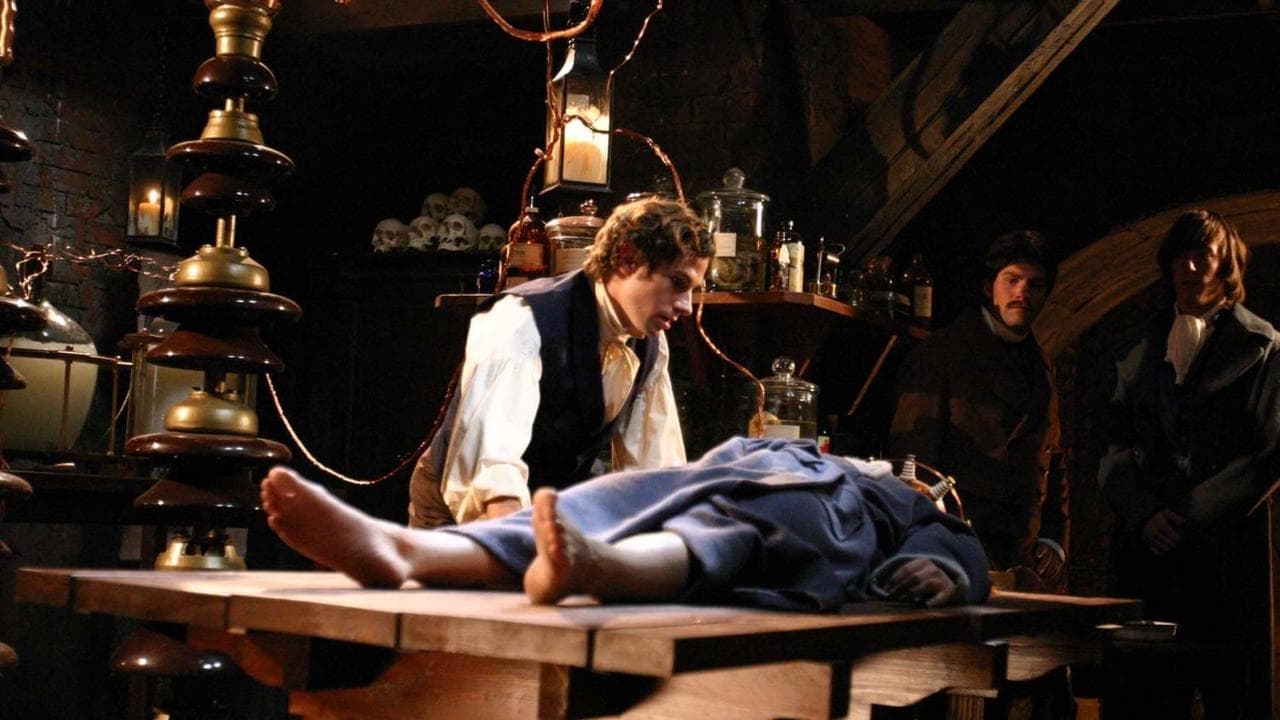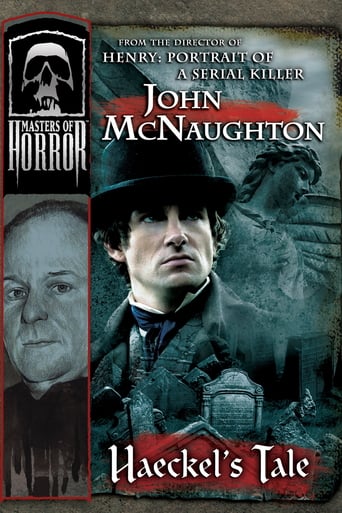



Mostly, the movie is committed to the value of a good time.
View MoreThere are moments in this movie where the great movie it could've been peek out... They're fleeting, here, but they're worth savoring, and they happen often enough to make it worth your while.
View MoreThe movie turns out to be a little better than the average. Starting from a romantic formula often seen in the cinema, it ends in the most predictable (and somewhat bland) way.
View MoreTrue to its essence, the characters remain on the same line and manage to entertain the viewer, each highlighting their own distinctive qualities or touches.
View More"Haeckel's Tale" takes place in the XIX century, which contributes to the dark and gloomy atmosphere, but the story itself is very slow and without tension, and twist is unsatisfying. It left me with the impression of a dark fairy tale more than horror. Film culminates in one of the most bizarre sex scene I've ever seen and, if for nothing else, it's worth watching this episode. Trust me, you won't forget it any time soon.6/10
View MoreJohn McNaughton's MOH entry is one of the more disjointed ones. It concerns a man who goes to witch doctor to see if she can revive his dead wife. She tells him the tale of a man named Haeckel, a Frankenstein type who was obsessed with making life out of death. That is, until one day he's traveling to visit his dying father and ends up staying with a woman with zombiephilia. It's refreshing to see an episode that's a period piece, but the lack of a cohesive story structure really hinders it. I would have liked to have seen more Clive Barker (who wrote the short story one which the episode is based) and less Mick Garris (who adapted it.) It is a fairly nasty episode and there are a few effective scare scenes. The ending is really gross and silly in a good way, but perhaps I only took at as that because everything that came before it was somewhat dull.
View MoreOriginally slated for George Romero's directorial whims--Haeckel's Tale--Based on a short story by Clive Barker--is a gruesome take revolving around necrophilia, necromancy, and of course Ernst Haeckel (Derek Cecil.) The film journey begins by showing a man desperately in love with his deceased wife. So much so, that he pursues an old woman evidently capable of raising the dead. However, he finds that his request is not as easy as he'd hoped for and must entertain the tale of Haeckel, as orated by the old hag, before he makes a final decision about his lady six feet under.The rationality of medicine & science drive Ernst Haeckel on his quest to prove reanimation is possible without God. That in fact, God is completely unnecessary in such matters. Needless to say, his pious peers are less than impressed when he sets a corpse on fire in his laboratory during a Dr. Frankenstein type experiment gone terribly amiss. Later on, Haeckel meets with the great necromancer: Montesquino. A sideshow act to some. Ernst thinks he's a charlatan, but is convinced otherwise via the help of his own senses and clamoring from the Wolfram's who let him stay at their house while en route to see his sick father. Which is another reason for Ernst's interest in necromancy... Not to mention his interest in Elise (Who the hell wouldn't be?) Anyhow, Elise is established as a necrophiliac who humps her dead husband in the graveyard surrounded by wandering corpses who join in on the orgy orchestrated by Montesquino. A ritual Haeckel & Mr. Wolfram will eventually partake in. After all, it's all about sex & death in the bloodied necropolis.This is a cool film. From the excellent script, acting, costumes, photography...it's got everything you could want, really. Most of all it feels authentic. And oh yeah, the end is pretty creepy...Mr. McNaughton, you've done well! I will definitely look into your oeuvre now, sir.Leela Savasta! You're stunning... I want to see the remake of Black Christmas now. Heh.
View MoreYoung Haeckel (Derek Cecil) wants to bring corpses back to life after studying the notes of German doctor Victor Frankenstein. He fails in his early attempts, and then sets out to discredit the necromancer Montesquino (Jon Polito, who co-starred with Cecil in "Push, Nevada") who can accomplish the task with magic rather than science.We start with a short story written by Clive Barker, who has made himself a living legend by writing "Hellraiser", among other things. Add a "bookend" story from Mick Garris, and you have a film. Not surprisingly, the part from Garris is weaker than the Barker core, but it is hard to blame him for trying to make this story fit into a nice package.George A. Romero was set to direct, but had to bow out due to scheduling conflicts. The opening credits still say this was "in association with" Romero, but his involvement seems minimal and what he added is unclear. Stepping into his shoes is John McNaughton, who had previously worked the horror scene with "Henry: Portrait of a Serial Killer" and "The Borrower". (McNaughton may be a "master of horror", but he has never defined himself so narrowly, working regularly in cop thrillers and comedies, as well.)McNaughton probably brought us some aspects Romero would have shied away from. Both have no qualms with gore, but McNaughton is more associated with sensuality than Romero, and that aspect of the film is a key aspect of the plot in the latter half. We know that McNaughton took over very early on, enough that he was taking part in the casting process. He also had direct input in the imagery, which was inspired by the artist Hieronymus Bosch and his "deadly orgies of skeletons".Of course, he cannot take full responsibility for the success or failure of the picture. McNaughton says "the crew was like a locomotive", and although he was only on set for ten days, they had been working on the series for months and knew how to maximize their resources. There was not even time for rehearsals beyond a table read, so casting known variables was key. Upon first seeing this film, viewers might feel that it is one of the weakest installments in the Masters of Horror series, due to the episode offering little excitement until the last ten minutes... which is then followed up by a "twist" ending that the audience should have seen coming halfway through the film. Repeat viewings might make viewers find something more. While it is true that the first half of the film relies heavily on retelling the Frankenstein story, which is well-established in other movies and not very innovative, the departure point is critical and the introduction of necromancy makes the film unique.The acting is fine, even if Jon Polito goes a bit over the top. McNaughton personally cast Polito, a regular in his work, knowing what he was able to bring to the role. The costumes and scenery are very nice. The effort put into getting period-appropriate outfits is noticeable and commendable. There is also great work from special effects wizard Howard Berger, particularly the dead dog puppet. Berger has few equals.For those looking deeper, you may find some interesting ideas touched upon, albeit briefly. There is discussion of bringing the soul back from the dead, and the declaration that animals have no soul. Haeckel finds this unusual, which seems out of character -- what use does a man without God have for a soul? And the idea certainly was not new. Many philosophers and theologians have declared animals soulless. George Hegel, in 1821, wrote, "An animal too has impulses, desires, inclinations, but it has no will and must obey its impulse if nothing external deters it." Haeckel also calls to mind the difference between religion and science, a "playing God" attitude that was largely absent in the "Frankenstein" story, at least in such a direct and blatant exposition.The features of the DVD are impressive, with plenty of interviews and featurettes. Someone could dismiss the Masters of Horror series as a television show, but the DVD proves these are films in their own right. Sadly, the commentary from McNaughton is sparse, and there are too many minutes of silence. But he still adds enough information to make a listen worthwhile.
View More